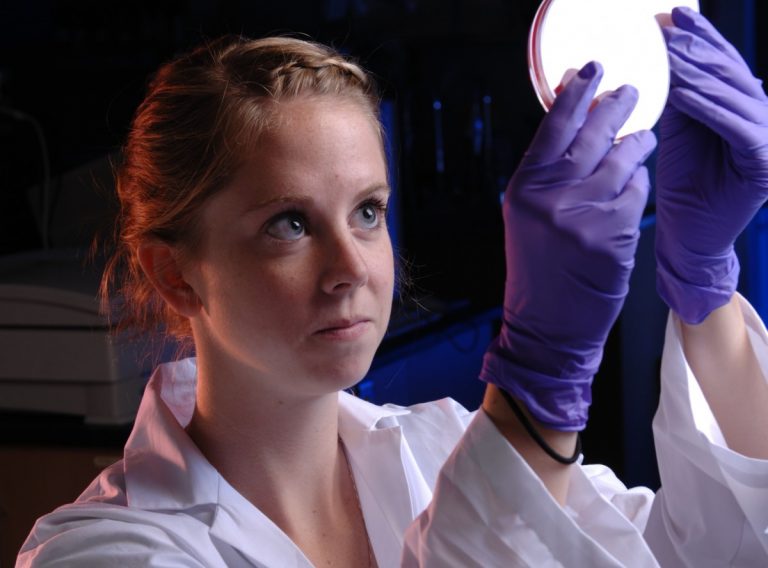
Studying at the College of Biological Science at the University of Guelph (U of G) doesn’t just mean putting your career on the pathway to excellence; it means acquiring the knowledge and skills that will help any keen learner understand today’s challenges to shape the world of tomorrow.
The College has an international reputation for the landmark research it conducts, as well as the significant contributions faculty and students have made to the world of Biological Sciences and society at large.
Split into three academic departments – Integrative Biology, Human Health and Nutritional Sciences, and Molecular and Cellular Biology – the College tackles the big (and microscopic) issues that have the potential to affect health, medicine, food and the environment in immeasurable ways.

It is this that has earned the College the Number One spot in the country for research income over the span of 15 years, according to Research Infosource, and the highest level of research funding from health granting councils compared to any other Canadian university without a Medical School.
Armed with an impressive US$12 million in external funding each year, the College is able to continue its mission to produce world-class research and foster the great minds that go on to make the revolutionary biological breakthroughs of the future.
This level of world renown is both a result of, and the driving force behind, the College’s close links with key industry and government players that rely on the fine work of U of G faculty to inform and guide policy.
“The service [faculty and staff] to our students, our academic disciplines, our industrial and governmental partners, our alumni, and society as a whole, is second to none,” says College Dean Jonathan Newman of the College faculty body.
“It is because of them that we have an active, vibrant teaching and learning environment, where knowledge is not only translated and transferred, but it is also created.”
The College’s success is in part due to its hands-on, experiential approach to learning that students receive as part of all courses.
At the undergraduate level, experiential learning is promoted and gives students the out-of-class involvement in their subject that proves so valuable in later life.
Through the wealth of experience, students develop transferrable skills, community connections, explore employment options, volunteer their services and even get international opportunities to understand the impact of their subject in other parts of the world.
In the first two years of the Biological Science undergraduate programme, students are already volunteering at Guelph General Hospital and working on science programs to engage the younger generation. By their third year, they become learning peers, pursue international exchanges and are highly involved in student research symposiums.

The fourth and final year is when they really get to explore, focusing on independent research in fields that really matter.
This pro-active approach equips graduates with the skills and know-how that can be transferred to any number of careers, such as human or veterinary medicine, rehabilitative therapies, dentistry, and pharmacy. It also charts a direct path to meaningful postgraduate study and research in a field that captivates you.
The College covers an array of graduate programs, all of which are in fields of significant societal and scientific interest. Majors with a focus on Human Health and Nutritional Sciences, Integrative Biology, and Molecular and Cellular Biology can be pursued as both Masters and PhD programs and all involve pioneering research in your field.
Guided by exceptional faculty, students pursue fundamental and applied research questions that impact both regional and global issues.
It is this level of involvement and the essential research skills that prepare graduates to enter the workforce with the ability and expertise to make a difference, as 2009 College graduate Dr. Adam Lewandowski found.
“I am so grateful for the unique academic opportunities I received as a result of being in the College of Biological Sciences at the University of Guelph, as the experiences and courses I took ultimately shaped my career path today,” he explains.
The Doctor highlights the impact of his fourth-year research project in motivating him to pursue his PhD at Oxford University in the UK.
Since graduating, Adam has taken the skills he learnt at the College of Biological Science and applied them in his crucial research into pregnancy complications.
“My research focus is on the long-term impact of pregnancy complications, such as being born early (preterm), on offspring cardiovascular health and ways of reducing cardiovascular disease risk,” he explains.
“The fundamental knowledge and skills I learned in my studies at Guelph formed a foundation of understanding of key molecular, anatomical, and physiological concepts that I draw on daily as part of my research.”

And Adam’s research is making waves, having published over 40 original peer-reviewed articles in scientific journals and his work has been widely featured by the media, including big names like Forbes, CBS News, BBC News, the Guardian and The New York Times.
With big plans to build on this success and continue with his pioneering research to determine how best to reduce cardiovascular risk in preterm-born individuals, the knowledge and skills Adam acquired at the University of Guelph set him on the right path to make waves in the science world, face the challenges of career success, and progress critical research that is changing and saving lives.
Follow the College of Biological Science at the University of Guelph on Facebook and Instagram
Liked this? Then you’ll love these…
Concordia University: Crafting collaborative solutions to 21st century issues
Ensuring Innovation: Universities producing job ready Biological Science graduates







